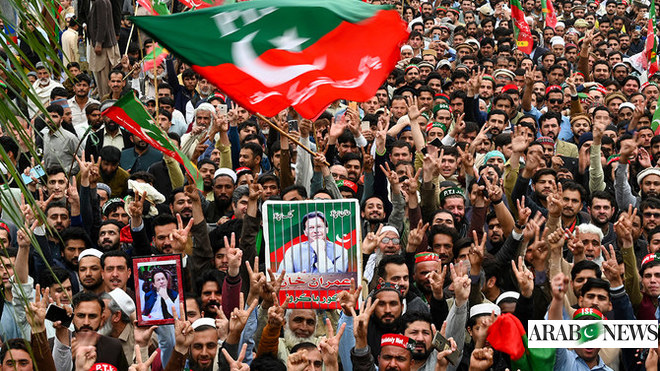Sit-ins continue in northwest Pakistan over surge in militancy, protesters reject army operations
PESHAWAR: Protest organizers leading a sit-in in Pakistan’s northwestern Bannu district on Tuesday opposed proposed military operations in the region and demanded that civilian agencies such as police and the Counter Terrorism Department (CTD) be empowered and better equipped to tackle a surge in militant attacks.
Pakistan’s federal government last month announced new operations to counter a new surge in militants along the border with Afghanistan. The main opposition party has opposed the operations, and thousands of people have rallied in Bannu, where a suicide bombing killed eight soldiers last week, calling on authorities to ensure peace and security.
Gunfire erupted at a rally in a northwestern Pakistani city on Friday, sending a crowd into a rally that is still ongoing, leaving at least two people dead and more than 20 wounded.
One of the protesters’ main demands is that federal and state authorities refrain from launching new military attacks in the area, where past military operations have forced hundreds of thousands of residents to flee.
“We cannot accept further military operations as we have already seen the consequences of military operations in South Waziristan and North Waziristan tribal areas that have left families homeless and houses destroyed,” Nasir Khan Bangash, chairman of the 45-member Bannu Aman Jirga and executive member of the Bannu Chamber of Commerce and Industry, told Arab News on Tuesday.
“Our view is that maintaining law and order is the job of the police and the CTD and any search operations to detain wanted persons or clear suspicious areas should be undertaken by the police and the CTD.”
Bangash added that the army’s mission was to “protect” the border and it was the constitutional duty of the police and CTD to ensure peace and internal security.
“In the backdrop of lawlessness, police and CTD forces should be better equipped to tackle any security issue in the district as both the forces have been formed for that purpose,” he added.
Pakistan’s military has conducted a series of operations in the country’s tribal areas since 2014, effectively dismantling the Pakistani Taliban (TTP), killing most of its most senior leaders and driving most of its fighters across the border into Afghanistan, where Islamabad says they are regrouping, a charge Kabul denies.
Islamabad blames the new surge in violence on Afghanistan’s Taliban government not doing enough to stop militants using Afghanistan’s territory to launch attacks into Pakistan, while Kabul says the rise in violence in Pakistan is an internal issue and that it will not allow militants to operate on its soil.
“Comprehensive Campaign”
Past military operations have displaced hundreds of thousands of people in Pakistan’s northwestern province of Khyber Pakhtunkhwa, destroyed countless lives and livelihoods, and sparked a civil rights movement by ethnic Pashtuns.
The announcement of the new Azm-e-Istekam operation has raised concerns about further displacement, but at a press conference this week Pakistan military spokesman Lt. Gen. Ahmed Sharif Chaudhry dismissed them, saying the operation was not intended to be a full-scale military operation.
“This is a comprehensive counter-terrorism operation, not just to eradicate terrorism but to uplift society as a whole,” he told a news conference.
Still, Bangash maintained that the people of Khyber Pakhtunkhwa did not want any kind of operation.
“Our main demand is peace and stability in the Bannu region, which is key to strengthening normal social life and business activities,” he said.
Bangash said the group has already held “constructive” talks with KP Chief Minister Ali Amin Gandapur and now the provincial supreme committee, comprising the province’s civilian leaders and army commanders, will meet on Thursday to discuss the issue.
But the sit-in, which entered its fourth day on Tuesday, will continue and any deal with the government must be approved by the protesters, he said.

